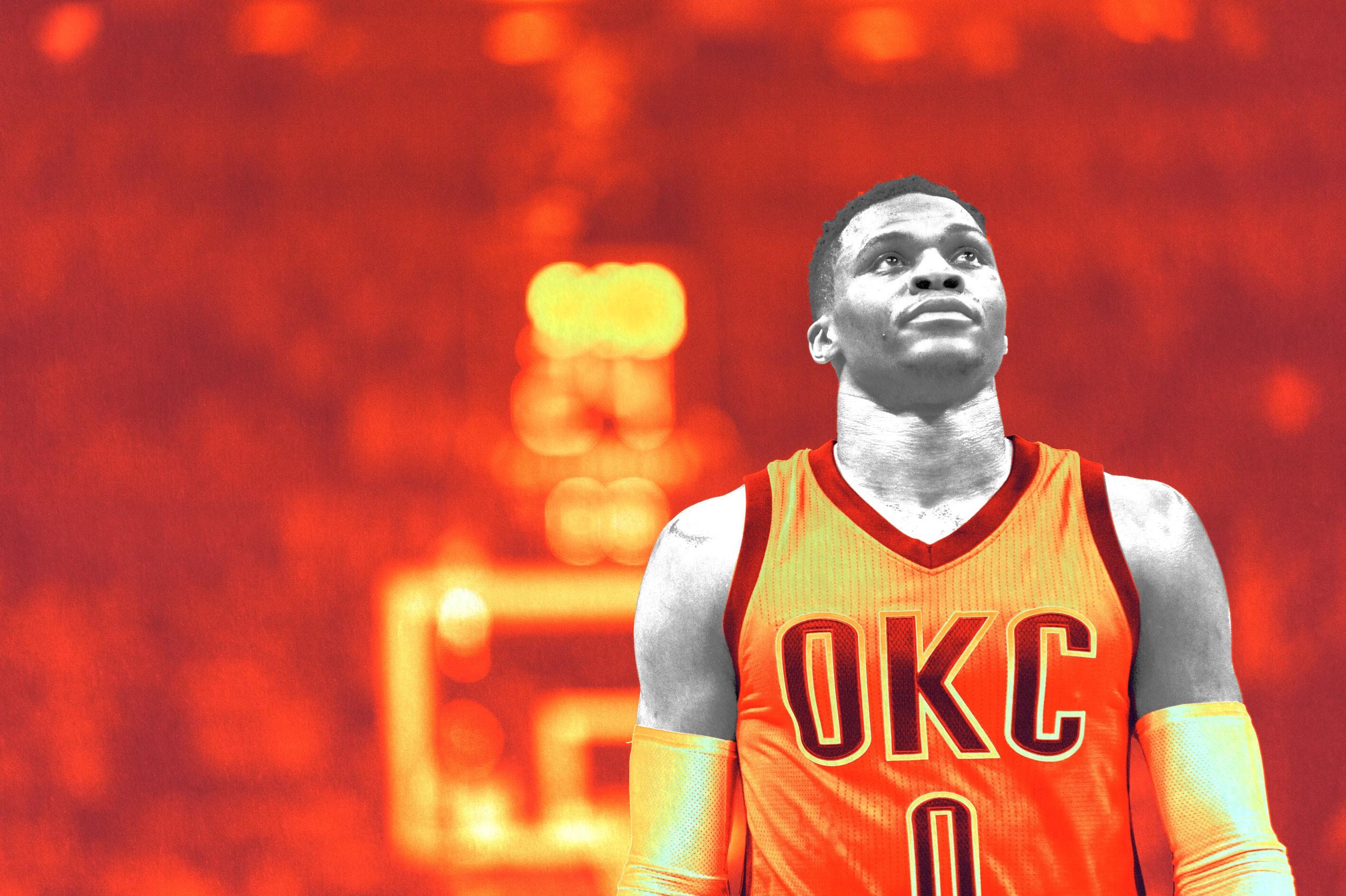
It is possible to be both amazing and wrong. It is possible to be iconoclastic and misguided, to inspire and to fail. It is possible to love Russell Westbrook and to accept that he is the problem.
Russell Westbrook is everything all the time, a player of incalculable gifts and immeasurable swagger. To watch his play is to watch Franklin’s kite — every electrical current is a revelation. This, coupled with an extravagant statistical season, has made him the likely winner of this year’s MVP race and a folk hero to NBA fans. And moreover, a Faulknerian figure — the One Who Stayed in Oklahoma City, eliciting loyalty the likes of which we rarely see in sports. There is something precise in the fandom he inspires — a shoot-your-shot star for a shoot-your-shot age. Flex, every shot seems to whisper. When he rumbles across half court, pounding the ball like a sledgehammer, he worries not about spacing or effective field goal percentage. He has his own orbit, his own supercharged strategy. Russ Russ-es. He thrives on drives, with a matador’s balleticism in the face of a charging rush and the bull’s goring horns. He is, in a word, punishing. In another, astonishing. He is my least favorite athlete.

The stakes of opposing Russ have heightened with every passing year, the volubility of his cult ever more fervid. To root for Russ is to define oneself: safety off, blinders on. Russ’s fans see themselves as pitched in a battle against a relentless, unconquerable machine — I know because I work with dozens of them. The Ringer is a pro-Russ workplace, through and through. On every play, Russ is fighting for his life, and theirs — an underdog whose circumstances have made his messy, manic, breathtaking, narcissistic style of play as controversial as it is charismatic. Self-belief is a powerful tool that has catapulted Westbrook from a gifted, extraordinary athlete into something far more meaningful: He is you, stuck in a traffic jam, ready to drive your monster truck over the masses into the great open road. The messiah of the misunderstood who needs not a friend, only a goal. And with this great power comes great responsibility. Denying Russ’s power — in bars, on social media, and at postgame press conferences — has consequences.
In the above clip from Sunday, Westbrook interrupts his teammate Steven Adams before he can answer a question about the Thunder’s struggles when Russ sits. The question came from Oklahoman columnist Berry Tramel, noted bête noire of the Thunder star, who became exasperated when Adams never responded after Westbrook’s soliloquy. Two years ago, my colleague Bryan Curtis tracked Tramel’s relationship with Westbrook and the uncommonly hostile and suspicious way the Thunder treat some members of the press. “[Westbrook] looks upon the media as invading his workspace,” Tramel said in 2015. “He doesn’t like it that we’re there.” That much is clear in the dismissive tone Westbrook assumes after Tramel asked his question Sunday. Westbrook’s decision to block the question is a microcosm of his problem: In an effort to help his team, and without realizing it, he hogs the moment in an act that is ultimately self-serving, hurtful, and distracting. Adams’s response to Tramel’s question likely would have been milquetoast and complimentary of Russ, and no one would have thought much of it — one more bland response in a forum for blandness. Tramel’s question may not have been effectively probing and its goal may have been a provocative nudge at his old rival, but the job of the press is to ask such questions, to provoke response, to get to the bottom of things. Westbrook upbraids that notion. He wants a closed loop, a controlled environment. He does not want to be denied.

The past eight days have been heady times for Westbrook deniers. As his Thunder have fallen behind the Houston Rockets 3–1 in their first-round playoff series, the referendum on Westbrook has become increasingly vital. Could a player who averaged a triple-double possibly be hurting his team? Certainly not in the microeconomic sense — the Thunder have been consistently worse when Westbrook has sat in the series than when he has played. His playoff counting numbers — averages of 35 points, 12 rebounds, and 11 assists — are even gaudier than during the regular season. The on-court/off-court data points have been used to buttress the argument on the essentialism of Westbrook. But within this narrow look come questions with a longer range: What of the exasperated veterans unable to conjure a rhythm as the Russ show prattles on? What of the stunted development of the Thunder’s young players? What of his undeniably poor shot selection? What of the do-it-all end-of-game approach? What of the unyielding fan base blind to the flaws?
These are questions for an alternate reality. Westbrook creates an enormous amount of possibility with his play, and then, in many cases, erases that possibility, as he has with two reckless fourth-quarter performances in the series. He has been the root and the boll weevil. The One Who Stayed has become something else — we can’t imagine Westbrook fitting in anywhere but Oklahoma City. And there’s no way to know what the Thunder would look like with, say, Mike D’Antoni’s system in place, or how Westbrook would play under Gregg Popovich in San Antonio. The only Russell Westbrook we have is the one we’re watching right now, and he is failing.

My distaste for Westbrook blossomed during the 2012 NBA Finals, when he took 16 more shots than Kevin Durant and shot just 3-of-22 from 3-point range in losing to the Miami Heat in five games. As Bill Simmons has written ad nauseam for the past five years, that Thunder team looked like an evolution in NBA gameplay — the Westrook-Durant–James Harden trio was a daisy chain connecting Durant’s silken scoring, Westbrook’s dervish routine, and Harden’s machine-learned ability to run the break. They possessed a maturing beauty. I held Westbrook’s ill-advised play — his audacity — in the series against him. Four months later, OKC general manager Sam Presti dealt Harden to the Rockets for assorted parts, and the dream of a homegrown Showtime Lakers to call our own died on the other end of Daryl Morey’s phone line. The choice between Westbrook and Harden seems almost absurd now, the two leading candidates for the MVP award five years later. But there never really was much of a decision. In January 2012, Westbrook signed a five-year, $80 million extension to stay in Oklahoma, so the choice for Presti — likely pressured by an ownership group unwilling to pay the luxury tax penalties that would come with three near-max-contract stars (not to mention Serge Ibaka) — was simple. Off Harden went to Houston, and with him the could be that became never was. The Thunder have not been to the Finals since, victims of injury circumstance, staggering opponents with championship pedigree (San Antonio in ’14; Golden State in ’16), and a supporting cast that has always felt one bullet short. Last summer, after Durant left for the Bay Area dream in Warriorsland, speculation boiled over that he had simply grown tired of playing with Westbrook, of ceding so many (bad) shots to a lesser player. If he didn’t, I surely had.
No one addresses these questions head on because doing so would disrupt a kind of false nicety among former players. Durant has not criticized Westbrook and likely will not. Only, for Westbrook there is no nicety. He is not humble, nor is he a well-wisher. He yelps “Thank you, Kyrie!” when Durant’s Warriors lose to the Cavaliers. He is, to quote a Ringer, a liar. He is pridefully petty, an avatar for a modern worldview that I happily report has little currency with me whatsoever. The origins of my opposition to Russ are on the court, where I felt robbed of seeing a historical player — Durant — achieving historical greatness. This, too, could be considered petty, I realize. But I saw a corrupted line of code in a beautifully written program. Get that thing out of there.
Over time, Westbrook has become a symptom of something less mathematical, less defined by efficiency or in-game optionality. He is an icon now, of play and personality. There are consequences of that kind of fame too. The person who created the cupcake meme — perhaps the single brattiest move a player has made against another player this century — was offended by Berry Tramel’s mundane question at a press conference for a game in which his team looked atrocious in the final quarter, giving up 40 points and a lead. This is not creating a false equivalency. It is pointing out a literal hypocrisy.
Hating Westbrook is foolhardy, I understand. It makes a person seem stodgy and unfun. It recalls the culture wars over Allen Iverson, another low-efficiency, high-emotion player who inspired thousands of fans. An anti-Westbrook campaign smacks of a scolding, old-world, back-in-my-day-ism. But that’s not my pretense for disliking Westbrook, nor is it the foundation for the argument. This is an aesthetic repulsion. They say that styles make fights, but in the case of the whirring, score-happy Thunder-Rockets series — which has amassed 881 points in four games — Oklahoma City has revealed a complete absence of style. They’re awful to watch, and, despite his power to thrill, the reason is Russell Westbrook.
As far as the disconnect is concerned, Russ feels like the first (likely) MVP of my adult life who belongs to a different generation than my own — Steph Curry and Durant are roughly the same age, but their identities are more shaded, less compelling. Westbrook is a change candidate, a prototype we’ve not seen before. Whether his legacy, his ability to inspire will translate to the future seems clear — I sense it in our office every day. He makes others watching him feel; when he succeeds, it’s like a reward, a justification, an endorphin blast. He is already a hero, even if his heroism is doomed. For Westbrook, pride is a gift, until it isn’t.
There are things about Westbrook that fascinate and entice even me. I’m not impervious to pettiness. I would love to root for a player who cares about Lil Uzi Vert even more than I do. But Uzi’s “Now I do what I want” is a fitting mantra for a player with a mastery of the entire floor — it’s a motto that would also fit LeBron James, Kawhi Leonard, Isaiah Thomas, Harden, or any other player in the MVP conversation. It’s not a puerile temper tantrum. It’s a decree: I do what I want because no one can stop me.
But Westbrook has shown that he can be stopped, that no matter how high he stacks his stats, how effectively he employs a meme, how aggressively he captures the attention of Twitter with a pregame fashion choice, there is a fundamental emptiness to his pursuit. His more is only about more. Jason Concepcion has compared Westbrook’s season to an eating competition — all that consumption, and nothing to show for it but excess. I might argue it’s more like a drinking contest. And now we’re hungover.

